SEO, or search engine optimization, is important for making your website more visible and getting free traffic to it. But no matter how hard you work, you may find that your SEO progress is slow or stops. This blog talks about important things that might be stopping your SEO from working and gives you real-world ways to fix them. If you fix these problems, your site will rank higher and be seen by more people.
Factors Involved in SEO Progress
1. SEO Keyword Competition Analysis
For SEO to work, you need to know how to deal with term competition. If your website doesn’t have much influence, it can be hard for your content to rank if you use terms that are very competitive.
Solution: Do a lot of study on SEO terms to find long-tail keywords that have low competition but a good number of searches. You can find these terms with the help of tools like Google Keyword Planner, SEMrush, and Ahrefs. Focus on these terms to build the reputation of your site, and then move on to more competitive keywords.
2. Mobile SEO Optimization
Mobile internet use is now higher than PC use, so mobile SEO improvement is now required. Google’s search system likes websites that work well on mobile devices because they make the experience better for users.
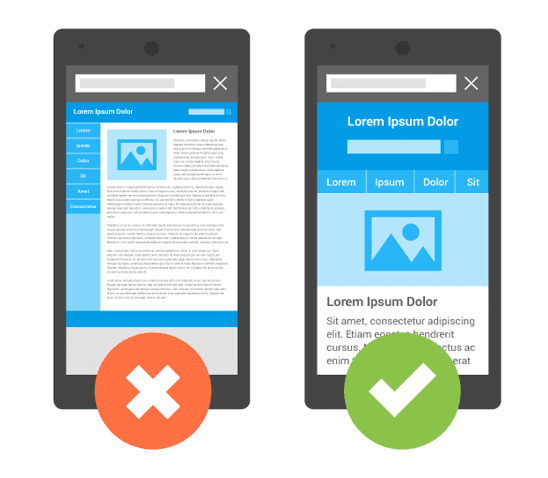
Solution: Make sure your website has a flexible design, which means it can be viewed on screens of different sizes. Make changes to photos and movies so they load faster on phones. Make buttons and links easy to click and use types that are easy to read. Use Google’s Mobile-Friendly Test tool to see if your site works well on mobile devices.
3. Technical SEO Issues
Technical SEO problems like bad links, a slow site, and a site that is hard for search engines to crawl can have a big effect on how well your site does in search results.
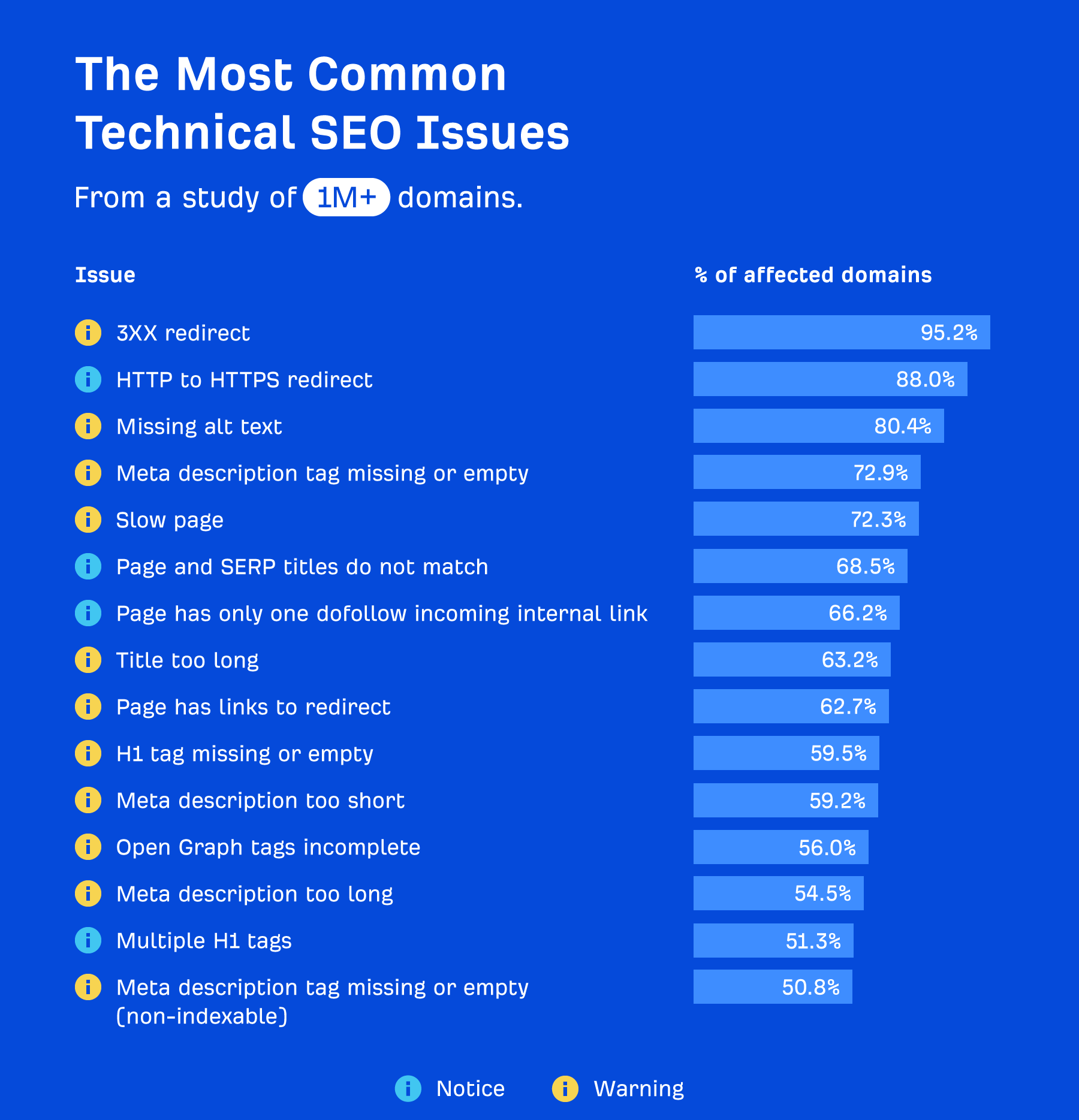
Solution: Do technical SEO checks on a daily basis to find problems and fix them. Optimize your pictures and use caching to make sure your site loads fast. Make an XML sitemap and send it to search engines to help them understand how your site is organized. Fix links that don’t work and use the right URLs. For safety, make sure your page uses HTTPS.
4. Thin Content SEO
Users don’t get much out of thin material, and it can hurt your results. Search engines like complete, high-quality material that answers users’ questions.
Solution: Give your material more value by going into detail and talking about different parts of a subject. Update your content often to make sure it stays useful and current. Don’t copy content, and use canonical tags to keep track of content that is the same on different pages.
5. Duplicate Content SEO
Search engines can get confused by duplicate content, which can hurt your results. It happens when the same or related content shows up on more than one page of your site or different sites.
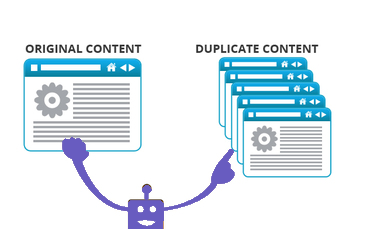
Solution: Find and get rid of information that is already there. To tell search engines which version of a page is best, use canonical tags. Make sure the material you write about your products is unique and useful.
6. Local SEO Optimization
Local SEO optimization is very important for companies that want to reach people in certain places. It helps you get in touch with people in your area who are looking for your services.
Solution: In your text and meta tags, use terms that are specific to the area. Make sure your business information is correct and up to date by claiming and improving your Google Business Profile. Get your customers to leave reviews, and then react to them right away. Put your business in local listings and make sure that the NAP (Name, Address, and Phone number) information is the same everywhere.
7. Meta Tag Optimization
Search engines can learn about the text of your page from meta tags. If you optimize your meta tags correctly, they can help people find and click on your links.
Solution: In your title tags and meta descriptions, use terms that are important. Try to keep meta descriptions and title tags to less than 155 characters and 60 characters wide. To make pictures more accessible and give more information, use alt tags. Put your information in order with H1, H2, and H3 tags to make it easier to read.
8. Social Signals SEO
Likes, shares, and comments on social media sites can have an effect on your SEO by making your material more visible and trustworthy.
Solution: Share useful information and encourage people to interact with you on social media to connect with your audience. People are more likely to share good content that speaks to them, which can help you get more backlinks and meet more people. Work with stars to get more people to see your work.
9. Online Reputation SEO
Your online image has a big effect on your SEO. Bad reviews and comments can turn away potential customers and hurt your search engine results.
Solution: Keep an eye on your online image by reading reviews and hearing people talk about your brand. Respond to bad comments in a professional way, and take care of problems right away. To smooth out any bad comments, ask happy customers to leave positive reviews.
10. SEO Keyword Research
Doing good term study is the basis of doing well with SEO. You could waste time and money by going after the wrong keywords without it.
Solution: Find appropriate terms that get a lot of searches but don’t have a lot of competition using tools like SEMrush and Ahrefs. Long-tail keywords are better because they are more detailed and take less time to rank for. Always keep an eye on how your keywords are doing and make changes to your approach as needed.
11. SEO Keyword Difficulty
Knowing how hard a term is to rank for helps you set reasonable goals. It takes more work and resources to rank for keywords that are hard to find.
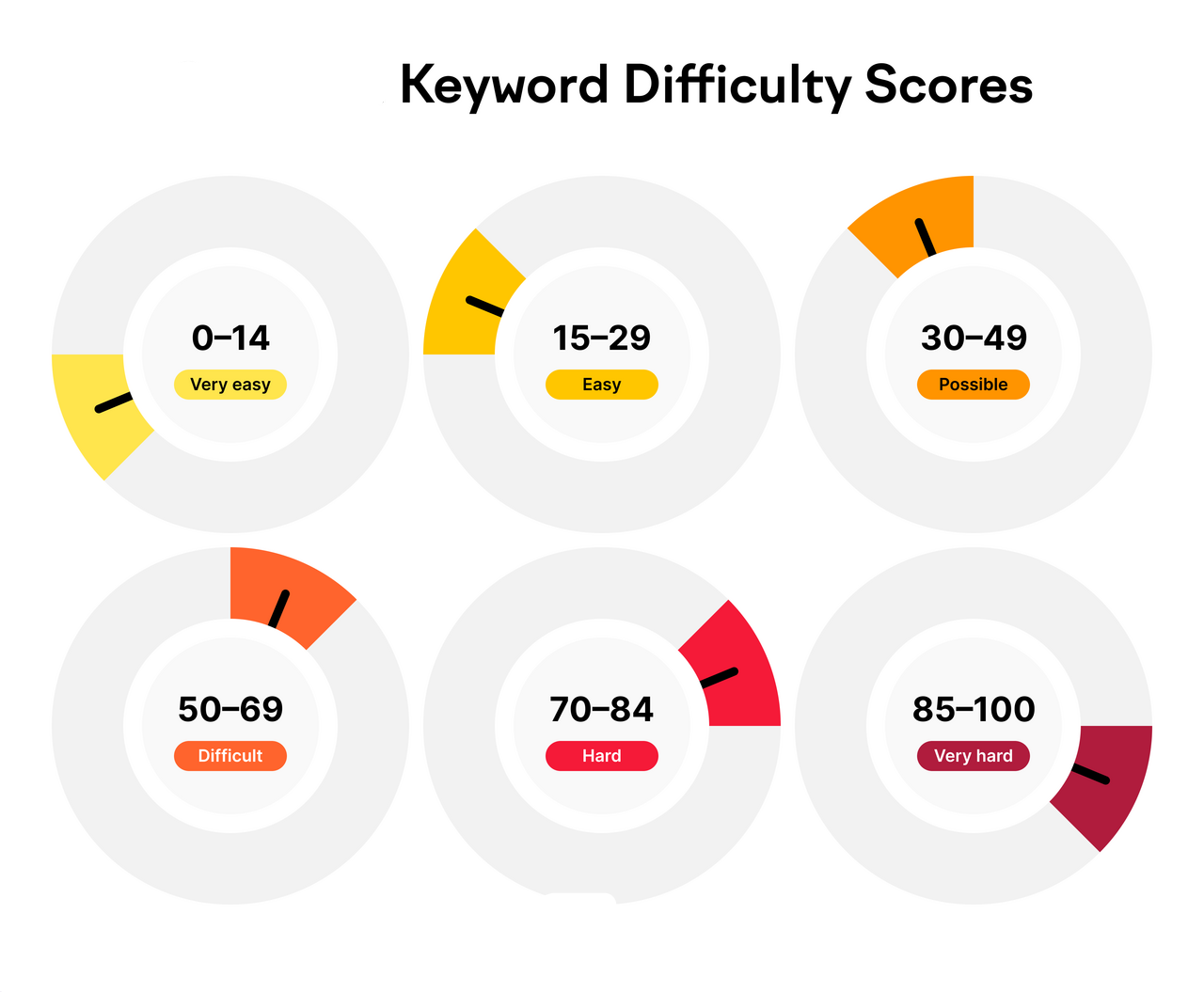
Solution: If your site is new or doesn’t have much influence, you should focus on keywords with lower effort scores. Target terms that are more competitive over time as your site gets more backlinks and trustworthiness.
12. Internal Linking SEO
Internal linking makes it easier for search engines to crawl your site and helps spread link value across all of your pages. It also makes the experience better for users by making it easy to navigate.
Solution: Link to important pages in your own material to make an internal linking system that makes sense. Make sure that all of the pages can be reached from the home page with just a few clicks. Anchor text should be informative for internal links so that they make sense.
13. Site Speed SEO
Site speed is a very important ranking factor. A page that takes a long time to load can make people leave quickly, which is bad for the user experience.
Solution: Speed up your page by optimizing photos and letting them load slowly. As little as possible, use browser cache and HTTP calls. You might want to use an information Delivery Network (CDN) to get information to people around the world faster.
14. Sitemap XML SEO
Search engines can better understand and find all of your pages with the help of an XML index.
Solution: Create and submit an XML sitemap to Google Search Console. Regularly update your sitemap to reflect any changes to your site’s structure. Ensure your sitemap includes all important pages and excludes those you don’t want to be indexed.
15. Responsive Design and SEO
Responsive design ensures your site provides a good user experience across all devices, which is essential for SEO.
Solution: Use a responsive design framework that adapts to different screen sizes. Test your site’s responsiveness using tools like Google’s Mobile-Friendly Test. Ensure images and other elements are optimized for all devices.
16. Broken Links SEO
Broken links can disrupt user experience and hinder search engine crawlability.
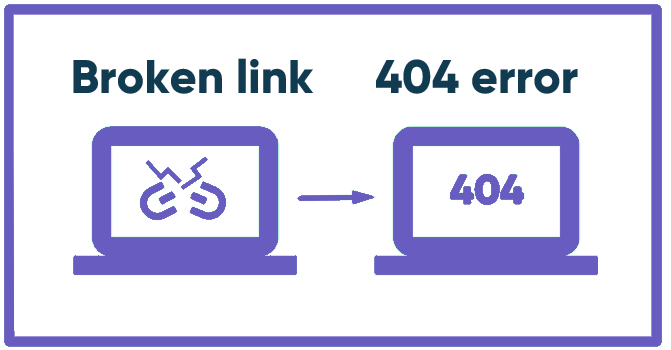
Solution: Regularly check for and fix broken links using tools like Screaming Frog. Use 301 redirects to guide users and search engines from broken links to the correct pages.
17. SEO Image Optimization
Optimized images enhance page speed and improve user experience, contributing to better SEO.
Solution: Compress images without sacrificing quality. Use descriptive file names and alt tags. Implement lazy loading to delay the loading of off-screen images until needed.
18. Canonical Tag SEO
Canonical tags help manage duplicate content by indicating the preferred version of a page to search engines.
Solution: Use canonical tags on pages with similar content to avoid duplicate content issues. Make sure that the canonical tag links to the material that is the most reliable.
19. Local SEO Directories
Listing your business in local directories enhances your local SEO and improves your online visibility.
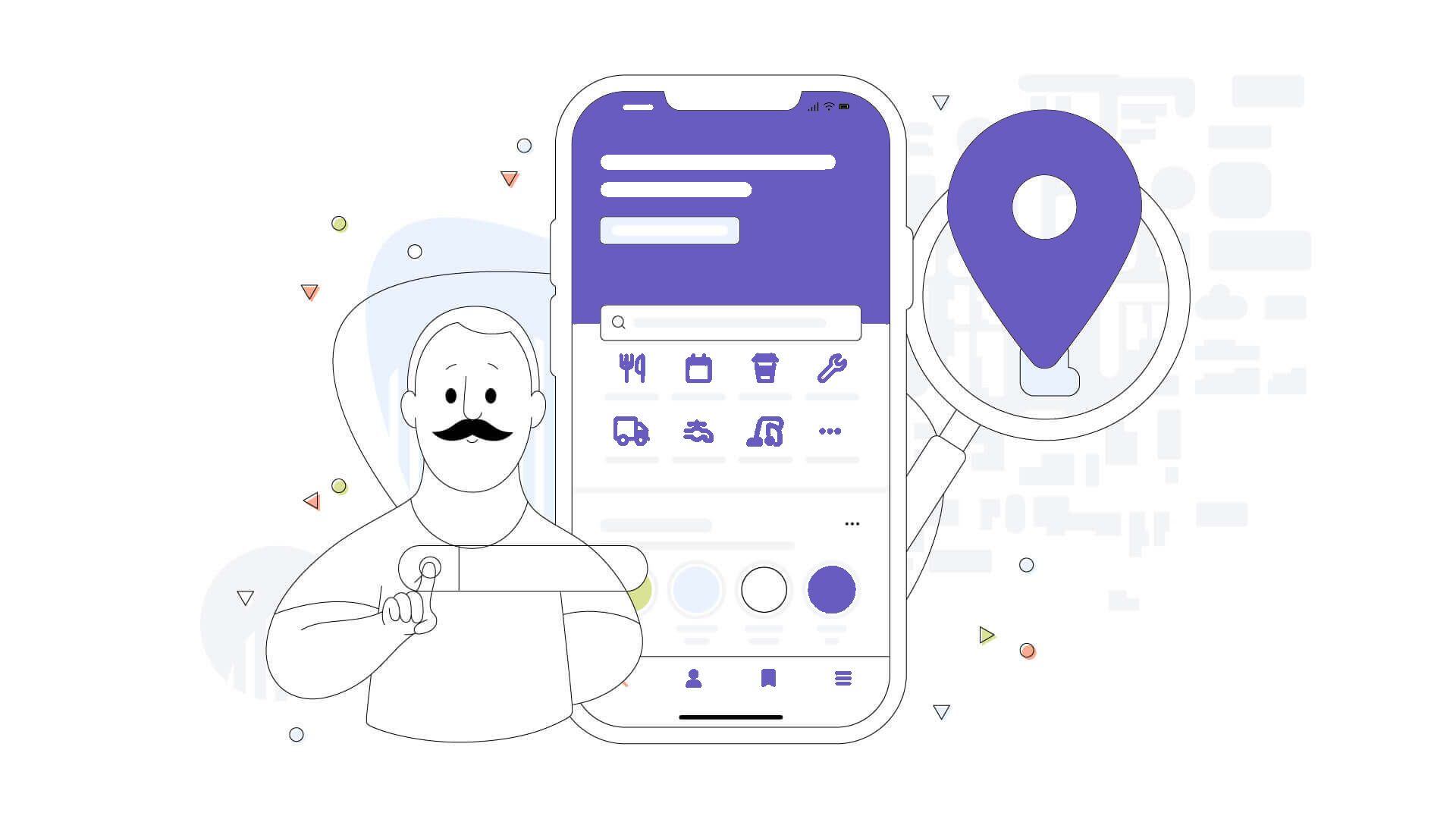
Solution: Submit your business information to relevant local directories. Ensure consistent NAP information across all listings. Monitor and update your listings regularly.
20. SEO Google Business Profile
Optimizing your Google Business Profile (GBP) can significantly improve your local search visibility.
Solution: Claim and verify your GBP listing. Provide accurate and detailed business information. Regularly update your profile with new photos, posts, and offers. Encourage and respond to customer reviews.
21. Backlink Profile SEO
A strong backlink profile indicates your site’s credibility and authority, positively affecting your rankings.
Solution: Build quality backlinks through guest posting, broken link building, and the Skyscraper technique. Focus on obtaining links from high-authority websites. Stay away from link scams and focus on making natural links instead.
Conclusion
Implement these strategies to enhance your SEO performance and achieve better rankings. Start with a thorough SEO audit to identify areas for improvement and take actionable steps to address them. Need help optimizing your website? Contact us today for expert SEO services that can boost your online visibility and drive more traffic to your site.
By addressing these common factors, you can remove obstacles to your SEO success and improve your website’s performance in search engine results.


